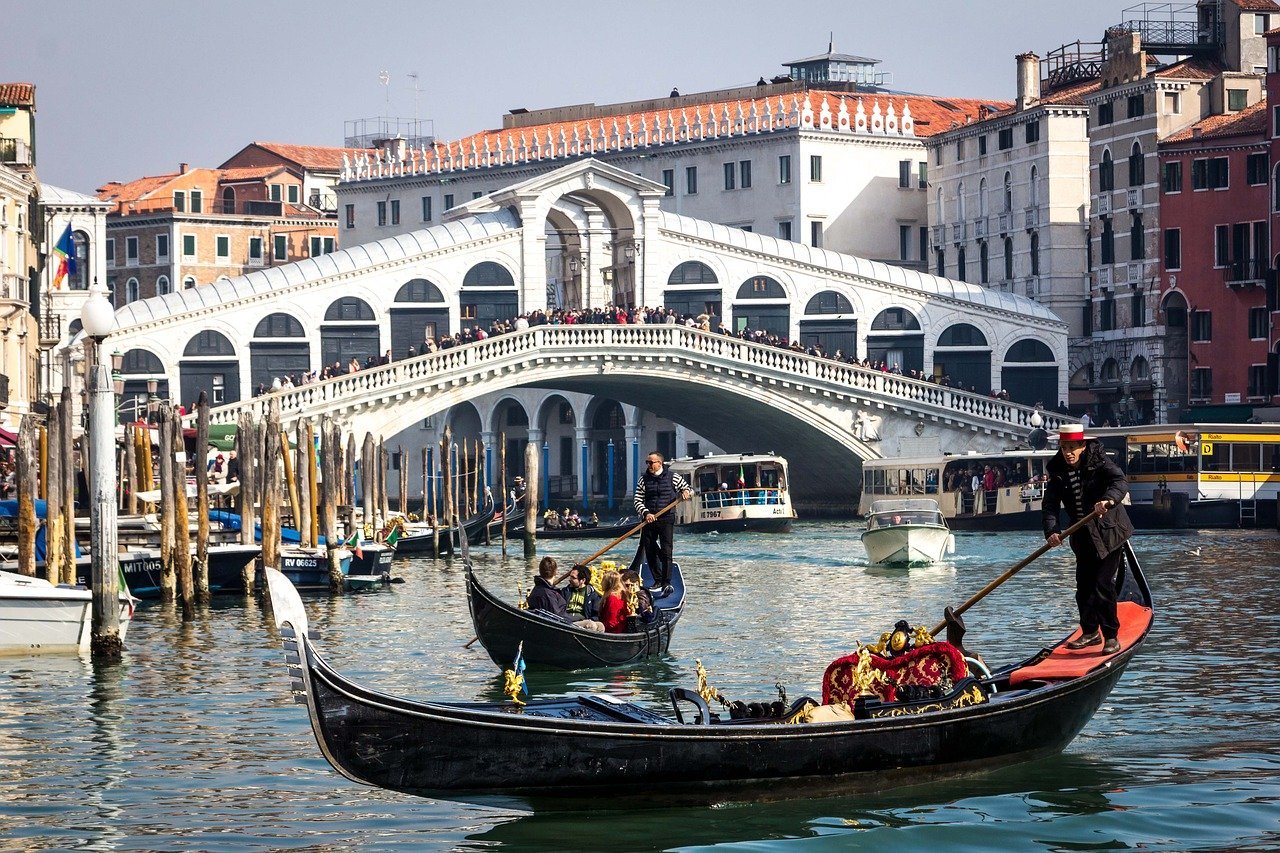
The thought of learning Italian future tenses can feel daunting, since many languages have complicated, exhausting rules on talking about something two weeks from now.
Luckily, Italian isn’t one of them. The Italian future tenses do come with some exceptions. But those are few and almost entirely logical. So once you can remember the cases where different rules apply, the rest will be a piece of cake.
To get right to it: there are two kinds of future. There's the simple future which, as its name suggests, is simply used when something is in the future. Then there is the future perfect, which is a tiny bit more complex. This is the I-will-have-done type of future.
The good news is that you can make yourself understood perfectly well in Italian without the future perfect. You can always come back to it later.
As you'll see, you can get started with the Italian future tenses quickly as the rules are straightforward for the most part. So by the end of this post, you'll be all set to talk about upcoming events and make future plans with your Italian buddies!
By the way, if you want to learn Italian through stories, not rules, my top recommendation for language learners is my Uncovered courses, which teach you through StoryLearning®. Click here to find out more and try out the method for free.
Table of Contents
Italian Future Tense Conjugation

Now, the three verb conjugations in Italian are: -are, -ere and -ire. All basic forms of verbs end on one of these three letter combinations:
- ballare (to dance)
- prendere (to take)
- capire (to understand)
While in English, when you want to say that you’ll be doing something in the future, you’d put words like “will” or “shall” in front of a verb, in Italian, you change the ending of the word. So to conjugate the Italian future tense, you need to use the Italian future tense endings.
For example, in the future:
- credere (to believe)
or
- io credo (I believe)
becomes
- io crederò (I will believe)
Italian Future Tense Endings -Are & -Ere Verbs
To make the future of regular verbs that end in either -are or -ere, you just take the stem of the word, basically the part before the -are or -ere, and add one of these instead:
| Pronoun | Italian Future Tense Ending | Example with prendre (to take) |
| io | -erò | io prenderò (I will take) |
| tu | -erai | tu prenderai (you will take) |
| lui/lei/Lei | -erà | lui/lei/Lei prenderà (he/she/you [formal] will take) |
| noi | -eremo | noi prenderemo (we will take) |
| voi | -erete | voi prenderete (you [plural] will take) |
| loro | -eranno | loro prenderanno (they will take) |
Like in the case of:
Prendere (to take)
You’ll say, when talking about yourself in the future:
- Io prenderò una carbonara (lit. I will take a carbonara/ I will have a carbonara)
If you want to say to your friend that he or she will take something, or ask them if they will, prendere will end -erai:
- tu prenderai (you will take)
- tu prenderai un bicchiere di vino? (you will/will you have a glass of wine?)
In the case of “he” or “she”, or the formal “you” that’s missing from the English language, the word will end in -erà, like this:
- lui/lei/Lei prenderà (he/she/You [formal] will take)
- lui prenderà più tempo (he will take more time)
Here, too, this will be the form for a question, as well, provided of course that you are asking a third person. If you and a group of people (or even just one more person, really) are telling someone else that you’ll take something, the verb will end in -eremo:
- noi prenderemo (we will take)
- noi prenderemo la camera sul terzo piano. (we will take the room on the third floor.)
If instead you want to tell, or to ask a group if they’ll take something, the end will be -erete, as in:
- voi prenderete (you [plural] will take)
- voi prenderete qualcosa da bere? (will you have/take something to drink?)
*Voi can be used as a formal You, just like Lei. This is something like thou/thee in old English.
And finally, if you want to tell someone that a group will take something, it’ll be -eranno:
- loro prenderanno (they will take)
- loro prenderanno l’autobus. (they will take the bus.)
Disappearing ‘e'
One thing to note is that the final e at the end of verbs that end in -ere often disappears, so that potere (meaning “to be able” in its verb form — as a noun it means “power” or, more similarly, “ability”) becomes:
- tu potrai instead of poterai
- lui/lei potrà instead of poterà
Italian Future Tense Endings -Ire Verbs
To make the future of verbs that end in -ire, you take the part before that and substitute one of these endings:
| Pronoun | Italian Future Tense Ending | Example with partire (to leave) |
| io | -irò | io partirò (I will leave) |
| tu | -irai | tu partirai (you will leave) |
| lui/lei/Lei | -irà | lui/lei/Lei partirà (he/she/you [formal] will leave) |
| noi | -iremo | noi partiremo (we will leave) |
| voi | -irete | voi partirete (you [plural] will leave) |
| loro | -iranno | loro partiranno (they will leave) |
Let’s take partire (to leave) as the example:
- io partirò oggi (I will leave today)
- tu partirai domani mattina (you will leave tomorrow)
- lui / lei / Lei partirà domani pomeriggio (he / she /you (formal) will leave)
- noi partiremo l’giorno dopo (we will leave the day after)
- voi partirete venerdì (you (plural) will leave Friday)
- loro partiranno prima (they will leave before)
Spelling Changes With Certain Italian Future Tense Verbs
Some verbs don’t have a vowel before the r of the future ending.
The endings for those words will be: -rò, -rai, -rà, -remo, -rete, -ranno, so all the time but for the letter “i” missing in the beginning.
This will be the case with words like with andare, dire or fare.
Let’s look at the case of andare:
- andare (to go)
becomes:
| Io andrò alla spiaggia | (I will go to the beach) |
| tu andrai alla scuola | (you will go to school) |
| lei andrà via domani | (she will go away tomorrow) |
| noi andremo insieme | (we will go together) |
| voi andrete da un'altra parte | (you both will go somewhere else) |
| loro andranno presto | (they will go soon) |
Verbs that end in -care and -gare, such as pagare (to pay) cercare (to seek), and spiegare (to explain) add an h before the future ending in the future. Like here:
- spiegare (to explain)
- io spiegherò (I will explain)
Verbs that end in -ciare and -giare, for example, parcheggiare (to park[a car]), cominciare (to begin), mangiare (to eat) and viaggiare (to travel) drop the letter “i” from the stem when in the future tense.
For example:
- viaggiare (to travel)
- io viaggerò (I will travel)
Irregular Italian Future Tense Verbs

And then, there’s the main catch: some Italian verbs are irregular. But you might be used to some of these from their present time forms. And there are irregular verbs in English as well: “to be” becomes I am, you are, she is, they will be…
There aren’t too many of these in Italian, and even the irregular ones aren’t all that difficult to get your head around. Many verbs are only “irregular” in that they simply skip over the vowel before the r in the end.
But then, some are a tiny bit more challenging. Like in the example above, essere, (to be) or io sono (I am) which is already quite a jump from its original form, becomes:
- io sarò
- io sarò lì tutto il giorno (I will be there all day)
Tu sei turns into:
- tu sarai la vincitrice (you [female] will be the winner)
In the third person, “he/she is” is transformed into:
- lei/lui sarà
- Lui/Lei sarà alla festa. (he/she will be at the party)
- Noi siamo (we are) becomes noi saremo,
- voi siete becomes voi sarete,
- and loro sono becomes loro saranno.
| io sarò | I will be |
| tu sarai | you will be |
| lei/lui/Lei sarà | he/she/you (formal) will be |
| noi saremo | we will be |
| voi sarete | you (plural) will be |
| loro saranno | they will be |
Irregular Verbs With Double ‘r'
Sometimes, verbs are irregular due to a pesky little double r. This is the case with tenere (to hold or keep), venire (to come) and volere (to want), among others.
Let’s look at the case of tenere, which can be used as a template for the other words:
tenere (to hold, to keep):
| io terrò | I will hold/keep |
| tu terrai | You will hold/keep |
| lei terrà | he/she/you will hold/keep |
| noi terremmo | we will hold/keep |
| voi terrete | you will hold/keep |
| loro terranno | they will hold/keep |
These are the main irregular Italian future tense verbs that you’ll come across when first starting out.

Italian Future Perfect
| io avrò parlato | I will have spoken |
| tu avrai parlato | you will have spoken |
| lui / lei / Lei avrà parlato | he/she/you [formal] will have spoken |
| noi avremo parlato | we will have spoken |
| voi avrete parlato | you [plural] will have spoken |
| loro avranno parlato | they will have spoken |
The other future tense to “worry” about in Italian is the future perfect.
This talks about a future that will be in the past, or less complicatedly, it says that something will have happened.
It is not difficult to get your head around if you’re familiar with the Italian past tense:
- io avrò parlato (I will have spoken)
- tu avrai parlato (you will have spoken)
- lui / lei / Lei avrà parlato (he / she / you [formal] will have spoken)
- noi avremo parlato (we will have spoken)
*you may have seen avremmo spelled with two m’s — this means “would have” instead of “will have”.
- voi avrete parlato (you [plural] will have spoken)
- loro avranno parlato (they will have spoken)
This tense can be used in a speculative way, as well:
- Avrà cambiato casa. (meaning maybe he’s moved)
*You could, and people sometimes do, say “he’ll have moved somewhere” English and mean the same thing.
You can always substitute sentences like this for the easy present tense version, as in forse ha cambiato casa, or “maybe he has moved” and achieve the same result.
Workarounds & Special Cases

You can also use the Italian future tenses to talk about things that aren’t in the future.
To express that you’re guessing at something, for example, such as:
- avrà vent’anni. (he or she will be twenty years old)
Meaning “she must be around twenty.”
or:
- saranno cento miglia. (it will be a hundred miles)
Meaning “it should be around 100 miles.”
You could also ask the question:
- dove sarà?
And mean “Where could he/she/it be?”
And someone could answer:
- forse sarà a casa (he/she/it might be at home)
Also, you can speculate about the reason for something, like this:
- Sarà che non l’ha chiamato. (it might be that he hasn’t called her)

Alternatives To The Future Tenses In Italian
But thankfully, you can also do a lot of talking about the future in Italian without actually using the Italian future tenses.
To give you an example:
- domani vado a ballare (lit. tomorrow I go to dance)
(you could also say it this way: domani andrò a ballare)
- venerdi faccio un giro in città (lit. Friday I will make a circle in the city)
meaning “on Friday I’ll go to town”. More formally, you’d say venerdi farò un giro in città.
In English, you can say “the holiday starts tomorrow” just the same. But in Italian, you can use it in more cases, such as when ordering.
You wouldn’t, in English, say “I take a coffee” while in Italian, prendo un espresso is perfectly correct, and using the future tense here would even sound odd.
Special Case With Quando (When)

Unlike in English, though, it’s customary to use the future tense when the word quando (when) comes up in Italian.
So “I will call you when I am by/near your house” becomes:
- ti chiamerò quando sarò sotto casa tua (sotto casa tua literally means “under your house”, which is how you’d say that you’re waiting by someone’s house.)
But, in informal language like talking to a friend, you can use the present just as much, and ti chiamo quando sono sotto casa tua is perfectly fine to do if the context is clear.
Note that also unlike in English, both parts of a correct Italian sentence can be in the future tense.
Let's take the previous example:
- ti chiamerò quando saró sotto casa tua. (lit. I will call you when I will be by your house)
All of these “workarounds” may sound like they are meant for people who don’t speak Italian fluently. But that’s not the case at all – Italians themselves will avoid using the Italian future tenses where possible, especially in casual conversation.
One such common alternative is the use of the word dopo (later):
- Ti chiamo dopo aver comprato un cellulare nuovo. (I will call you once I have bought a new cellphone.)
Italian Future Tenses FAQ
How many future tenses are in Italian?
Italian has two main future tenses:
Futuro Semplice (Simple Future)
Futuro Anteriore (Future Perfect)
These tenses are used to express different aspects of future actions.
What are the 4 future tenses?
In Italian grammar, there aren't 4 distinct future tenses. However, Italian does have various ways to refer to future actions depending on the context, which can sometimes be confused as separate “tenses.”
These include:
Futuro Semplice: Indicates actions that will happen in the future.
Example: Domani andrò al mercato. (Tomorrow, I will go to the market.)
Futuro Anteriore: Indicates actions that will have been completed before another future action.
Example: Quando arriverai, avrò già finito il lavoro. (When you arrive, I will have already finished the work.)
Present Tense Used for the Future: Often, the present indicative can refer to the future, especially in casual speech.
Example: Domani vado al mare. (Tomorrow, I’m going to the beach.)
Conditional as Future in the Past: The conditional tense can describe future events from a past perspective.
Example: Pensavo che sarebbe arrivato presto. (I thought he would arrive soon.)
What is the difference between futuro semplice and futuro anteriore?
Futuro semplice describes actions that will happen in the future. Example: Partirò domani. (I will leave tomorrow.)
Futuro anteriore describes actions that will have been completed before another future action or time.
Example: Avrò finito il libro prima di andare a dormire. (I will have finished the book before going to sleep.)
It's often used in sentences with temporal conjunctions like quando (when), appena (as soon as), or dopo che (after).
What is the future perfect tense in Italian?
The future perfect tense in Italian is the futuro anteriore. It's formed using the future tense of the auxiliary verb (essere or avere) + the past participle of the main verb.
Example of Formation:
With avere: Avrò mangiato (I will have eaten)
With essere: Sarò arrivato/a (I will have arrived)
This tense is used to describe actions that will be completed before another point in the future.
Out Of The Books And Into Real Life

So the future tense in Italian isn’t a necessity. But it is an important part of being able to express yourself clearly and comfortably. And isn't that what we all want at the end of the day?
Although it can be a bit daunting when you're faced with Italian future tense conjugations and exceptions, the Italian future tenses aren't all that tricky. So it's time to get your nose out of the grammar books and into real life.
In fact, the best thing you can do now is get plenty of exposure to Italian through reading Italian books or listening to Italian podcasts or watching Italian movies. That way, you'll get to see the Italian future tenses in action. And before you know it, they'll become second nature.
That's how I learned Italian in 3 months while living in London. Instead of stressing out about grammar and spending all my time with my head in a textbook, I focused on making daily contact with the language through interesting content: blog posts, podcasts, books. Whatever interested me and whatever I could get my hands on.
I also teach this StoryLearning® method in my course, Italian Uncovered, where you learn Italian by reading a compelling story designed for beginners. You start with the story and immersing yourself in the language.
And then, as you read through it, you learn the essential grammar and vocabulary you need to reach a conversational level in the language. So if you're sick of grammar exercises and vocabulary lists, get your free 7-day trial of Italian Uncovered.

Olly Richards
Creator of the StoryLearning® Method
Olly Richards is a renowned polyglot and language learning expert with over 15 years of experience teaching millions through his innovative StoryLearning® method. He is the creator of StoryLearning, one of the world's largest language learning blogs with 500,000+ monthly readers.
Olly has authored 30+ language learning books and courses, including the bestselling "Short Stories" series published by Teach Yourself.
When not developing new teaching methods, Richards practices what he preaches—he speaks 8 languages fluently and continues learning new ones through his own methodology.










































